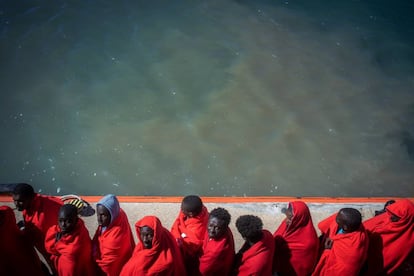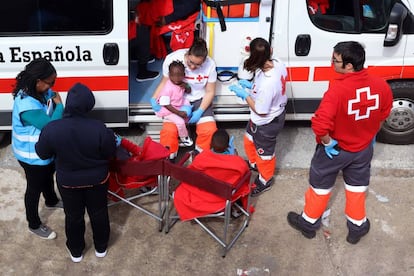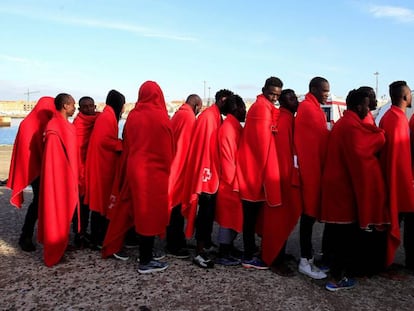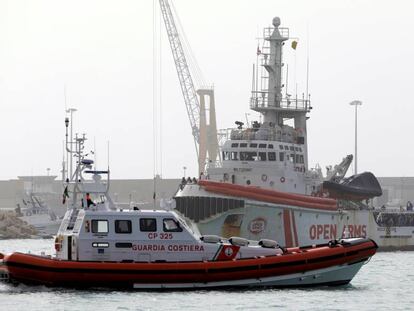Ill-equipped to deal with new influx, Spain leaves migrants to their fate
Support associations criticize lack of planning by authorities despite reports warning of rise in arrivals

Amadou is just 18 years old. He has the beginnings of a mustache and bright keen eyes, and he has spent the last four months on the road. It’s been a tough trip but he describes it without turning a hair. After being thrown out of his home in Guinea, he was kidnapped by a group of Tuareg.
When he finally managed to escape, he set out on the 6,000-kilometer journey that brought him to Cádiz, in southern Spain, where the authorities and social services are struggling to cope with a large influx of migrants like himself coming in on over-crowded boats. “The time I was most scared was when I was out at sea,” he says. “I spent nine hours in a dinghy and there was a storm and we ran out of fuel.”
More than 1,900 people have arrived in the first five months of this year in Cádiz alone
As Amadou recounts his experiences, the doorbell of the Cardijn Center rings relentlessly. This safe house is awash with people in search of help, having failed to find any through official channels. More than 1,900 people have arrived in the first five months of this year in Cádiz alone, which is 95% more than last year, according to the Red Cross. Volunteers say that migrants arrive with severe dehydration and burns resulting from the mix of gasoline and salt water on their skin. Every hour there are more arrivals and, with better weather approaching, the numbers will only grow faster.
Unable to deal with the dimensions of the crisis, authorities are abandoning hundreds of migrants to their fate, hoping they will cope on their own after the mandatory 72-hour detention. The Andalusia region has seen 3,400 migrant arrivals in May alone, and the police holding cells are overflowing. Nor is there space for them in the Immigrant Detention Centers (CIEs), where they can be kept for up to two months while the authorities see if they can be deported. The NGOs working in this field are also stretched beyond their limits.
The cracks in the system are nothing new. As Ombudsman Francisco Fernández Marugán said in April: “There is a notably precarious framework to articulate humanitarian attention worthy of that name, beyond purely police work. Both aspects can and should be made compatible; particularly, we again insist, given how often these situations have occurred in the last 30 years.”
In 2017, the number of arrivals doubled the previous year’s, according to the International Organization for Migration – 26,941 compared to 13,246 in 2016. Because of the agreements with North African countries, Moroccans and Algerians are easily returned home. But when it comes to sub-Saharan migrants, it’s more difficult as their country of origin is often hard to determine. And when the detention period expires, they are generally released and left to cope on their own. Last Thursday, a group of 15 African men were walking around the port in Cádiz in search of a call shop. Another 21 walked the 14 kilometers in the early hours of the morning from the San Fernando police station to the migrant shelters in Cádiz.

Last week Jemi Sánchez, the social rights counselor in Granada, received a call and was told that she had an hour to prepare for the arrival of 54 immigrants. The centers in Motril were over capacity, the new arrivals had been moved to the police station in Granada and they would be released after the stipulated 72 hours of detention, she was informed.
Sánchez ran to the supermarket to buy bread and cheese as the migrants had spent three days eating nothing but biscuits. She also mobilized Granada’s humanitarian network, including a parish and a mosque. “I called everyone,” she says. “It was chaos.”
She set up a makeshift camp at the bus station and bought chargers so the migrants could use their cellphones and tell their loved ones that they were safe. “The main thing was looking after them, but people have to be held accountable because the way they were abandoned was not right,” she says. EL PAÍS asked the Secretary of State for Security and the government delegate’s office for comment but received no response.
235 die trying to reach Spain
According to the UN's International Organization for Migration,30,300 people have crossed the Western Mediterranean to Europe this year so far, a much lower figure than in the same period in 2017, when 62,219 used this route. However, the numbers coming to Spain are higher than in previous years. And registered deaths from the Western Mediterranean crossing until the end of May were higher than in the previous four years, with a total of 235 either dead or missing.
The dissatisfaction with the way the system works is evident at every stage of the migrants’ reception process. “Reports produced last year predicted that the numbers would double in 2018,” says a police spokesman in Cádiz province. “You might expect something would have been done, but, apart from photo ops, nothing has. There was zero preparedness.” Meanwhile, Carlos Carvajal, head of the Cardijn center, says: “The situation is out of control. We are not living up to our moral obligations.”
But the problem goes deeper. “The Cádiz Bar Association doesn’t have a specific public defender for immigration so the lawyers don’t have specific training. Moreover, the judicial summons are collective, not individual,” says Jesús Mancilla, secretary of the migrant support association Algeciras Acoge. According to a police source in Cádiz, courthouses are also struggling to cope, as recently witnessed in Barbate where dozens of immigrants were waiting for a decision on their transfer to the CIE in Madrid.
Meanwhile, thousands of immigrants continue to plan their route to Europe, with France and Germany often the favored destinations. “We think we are at the center of the universe and that they want to come to Spain,” says Mancilla drily. Amadou, for one, has no intention of remaining in Andalusia and is keen to continue on his way. His next stop will be Madrid, where he will get in touch with his cousin and start to put his life back together.
“I didn’t even want to come to Europe in the first place,” he says. “I just wanted to continue with my studies and that’s what I’m going to do. I want to study economics.”
English version by Heather Galloway.
Tu suscripción se está usando en otro dispositivo
¿Quieres añadir otro usuario a tu suscripción?
Si continúas leyendo en este dispositivo, no se podrá leer en el otro.
FlechaTu suscripción se está usando en otro dispositivo y solo puedes acceder a EL PAÍS desde un dispositivo a la vez.
Si quieres compartir tu cuenta, cambia tu suscripción a la modalidad Premium, así podrás añadir otro usuario. Cada uno accederá con su propia cuenta de email, lo que os permitirá personalizar vuestra experiencia en EL PAÍS.
En el caso de no saber quién está usando tu cuenta, te recomendamos cambiar tu contraseña aquí.
Si decides continuar compartiendo tu cuenta, este mensaje se mostrará en tu dispositivo y en el de la otra persona que está usando tu cuenta de forma indefinida, afectando a tu experiencia de lectura. Puedes consultar aquí los términos y condiciones de la suscripción digital.









































